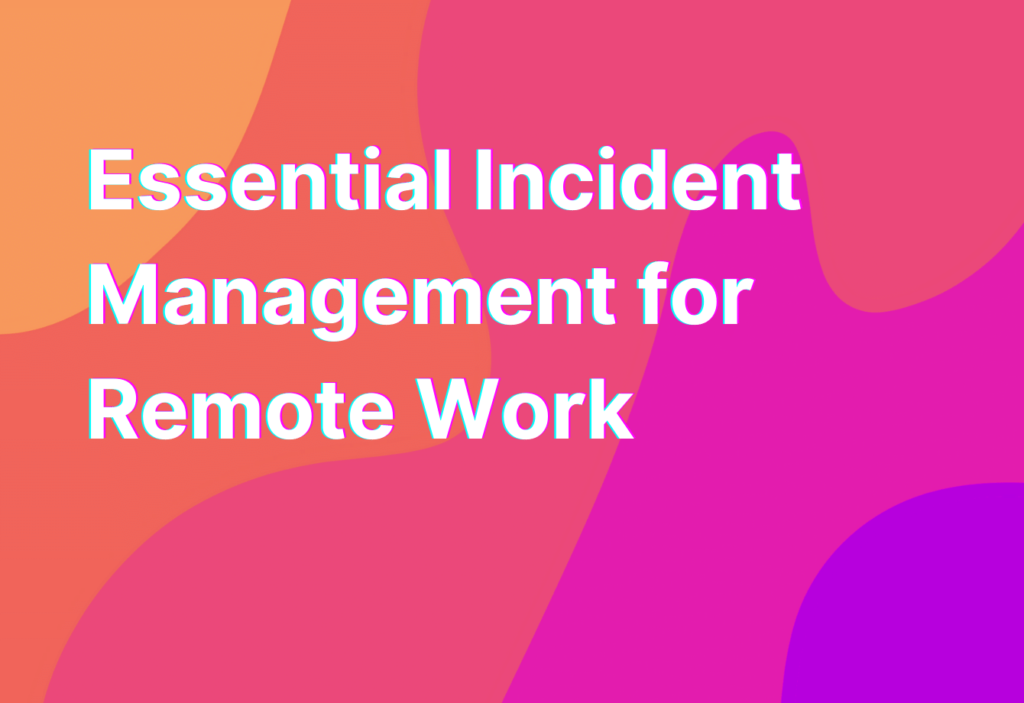Essential Incident Management for Remote Work
Working remotely has become increasingly popular in recent years, and with the current global situation, it has become a necessity for many. While remote work offers numerous benefits, it also comes with its own set of challenges. One of these challenges is incident management. In this article, we will explore the essential aspects of incident management for remote work and provide you with valuable tips and advice to ensure a smooth and efficient remote work experience.
What is Incident Management?
Incident management refers to the process of identifying, analyzing, and resolving incidents that occur within an organization. An incident can be any event that disrupts normal operations or has the potential to do so. In the context of remote work, incidents can range from technical issues, such as network outages or software failures, to communication breakdowns or even cybersecurity breaches.
Effective incident management is crucial for remote teams to minimize downtime, maintain productivity, and ensure a positive remote work experience for all team members. Let’s dive into some essential practices for incident management in a remote work environment.
1. Establish Clear Incident Reporting Channels
When working remotely, it’s essential to have clear and efficient channels for reporting incidents. This allows team members to quickly and easily report any issues they encounter, ensuring that they are addressed promptly. Utilize communication tools like Slack or Microsoft Teams to create dedicated channels for incident reporting. Encourage team members to report incidents as soon as they occur and provide clear guidelines on what information should be included in the report.
2. Define Incident Severity Levels
Not all incidents are created equal. It’s important to establish a system for categorizing incidents based on their severity levels. This helps prioritize the resolution process and ensures that critical incidents are addressed with the highest priority. Consider using a three-tiered system, such as low, medium, and high severity levels, to classify incidents. Clearly communicate the criteria for each severity level to all team members to ensure a consistent understanding.
3. Create an Incident Response Plan
Having a well-defined incident response plan is essential for remote teams. This plan should outline the steps to be taken when an incident occurs, including who should be notified, how the incident should be documented, and the expected timeline for resolution. Make sure all team members are familiar with the incident response plan and have access to it at all times. Regularly review and update the plan to reflect any changes in the remote work environment.
4. Foster a Culture of Collaboration
Remote work can sometimes lead to a sense of isolation among team members. To effectively manage incidents, it’s important to foster a culture of collaboration and encourage open communication. Create opportunities for team members to share their experiences, challenges, and solutions. Encourage the use of collaboration tools like Trello or Asana to track and manage incidents collaboratively. By working together, remote teams can effectively address incidents and find innovative solutions.
5. Prioritize Cybersecurity
Cybersecurity is a critical aspect of incident management in a remote work environment. With the increasing number of cyber threats, it’s important to prioritize cybersecurity measures to protect sensitive data and ensure the integrity of remote work systems. Implement strong password policies, use multi-factor authentication, and regularly update software and security patches. Educate team members about common cybersecurity risks and provide resources for remote cybersecurity best practices.
By following these essential incident management practices, remote teams can effectively address and resolve incidents, ensuring a smooth and productive remote work experience for all team members. Remember, incident management is an ongoing process, and continuous improvement is key. Stay proactive, adapt to new challenges, and embrace the benefits of remote work.
Wrapping Up
Incident management is a crucial aspect of remote work. By establishing clear incident reporting channels, defining severity levels, creating an incident response plan, fostering a culture of collaboration, and prioritizing cybersecurity, remote teams can effectively manage incidents and maintain productivity. Remember to stay proactive and continuously improve your incident management processes to ensure a smooth remote work experience.
For more information on cybersecurity in remote work, check out our article on Key Pair Cybersecurity for Remote Work. Stay safe and happy remote working!


